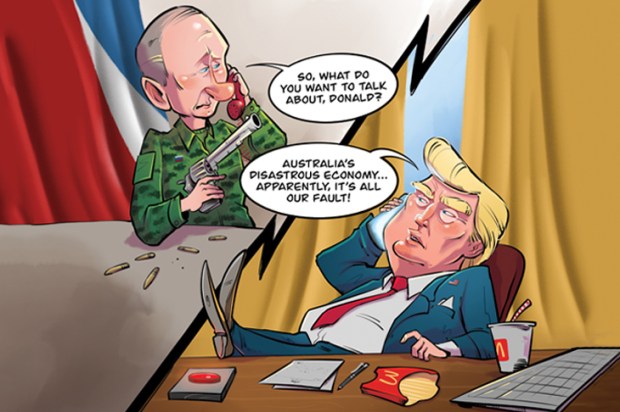Watching the Albanese government brings to mind the 1990s movie Forrest Gump. The government’s policies are ‘like a box of chocolates. You never know what you’re gonna get’.
Having gone to the 2022 election committing to not make changes to negative gearing or capital gains tax, the Albanese government has now tasked Treasury to look at ‘options to curb the use of negative gearing and the capital gains tax deduction for investors’.
It has even been suggested that Treasurer Jim Chalmers has wanted to ‘reform’ negative gearing since he was a staffer for former Treasurer Wayne Swan. Perhaps this should not surprise given that Chalmers directed Treasury to include a detailed analysis of negative gearing within last year’s annual tax expenditures and insights statement. This statement estimates revenue theoretically foregone by setting tax rates below a benchmark rate.
The last known time the government tasked Treasury to look at tax policy options resulted in changes to the Stage 3 tax cut. Changes which broke an election promise and increased taxes on middle- and higher-income earners so as to finance a tax cut for lower-income earners. This was done in large part through the re-insertion of a tax bracket which will over time enhance bracket creep tax receipts to the government and will ultimately nullify the benefits of income tax cuts.
Thus far, as before the election, Prime Minister Albanese has ruled out changes saying, ‘We have no plans to touch or change negative gearing’. But the government had no plans to change the Stage 3 tax cuts until it had plans to change the Stage 3 tax cuts.
The government’s action in starting a discussion on property investor taxes is most likely a reaction to the political pressure coming from the Greens whose stated objective is to reduce the value of property in Australia in real terms.
Max Chandler-Mather, the Greens’ housing spokesperson, confirmed as much in July of this year when he said, ‘I think our goal, our stated goal, is to stop house price growth, so zero per cent growth, to give wages a chance to catch up’. The Greens also want to introduce rent caps, the recent removal of which in Buenos Aires, Argentina led to a 170 per cent increase in rental supply and a 40 per cent reduction in rents in real terms.
The Greens’ housing policy is part of a broad suite of tax increases and market interventions which, if implemented, will further distort and retard the Australian economy. This includes their pernicious ‘Robin Hood tax’ proposal to charge 40 per cent on the ‘excessive profits of big corporations to fund significant cost of living support’.
What the Greens define as excessive profit is unclear but there are many Greens members and supporters who consider any profit excessive.
It is unclear what instructions or terms the government gave to Treasury to conduct this analysis, but given the government’s voracious appetite for spending, particularly with an approaching election, options and advice which might result in a net reduction in tax revenues are very much unlikely to be presented. Hopefully though, but not certainly, Treasury’s advice will also assess the potential impact on the Australian financial system.
According to Treasury’s most recent tax expenditure report, during 2020-21, approximately 1.1 million property investors collectively incurred rental losses totalling $7.8 billion, resulting in a tax benefit of roughly $2.7 billion.
By their very nature, negatively geared properties are financed through loans, often with high loan-to-value ratios. It is highly likely that these numbers are higher now given increased interest rates.
Should changes to negative gearing and capital gains tax lower the value of investment properties, it will not only impact investors, but also Australian banks who hold the loans. And should investors on the margin start to default on their loans or be forced to sell, it could trigger a downward valuation cascade similar to the chain of events that contributed to the start of the global financial crisis in 2007.
There is, nevertheless, an alternative policy to reduce the benefits of negative gearing and the capital gains tax discount on the property market. Such a policy would also help tilt the market towards home buyers and away from investors.
This alternative policy would be to legislate significant income tax cuts thus reducing the benefits of property tax concessions. Additionally, there would be spill-over benefits from cutting both taxes and government spending as it would stimulate productivity thus also putting downward pressure in inflation and interest rates.
But cutting taxes would require the government to cut spending and unfortunately, cutting taxes and spending, despite wider economic benefits, would be antithetical for the government, Greens and Treasury.
Australians have seen this movie before. In July 1985, the Hawke Labor government abolished negative gearing. This was before Australia had a capital gains tax which was only introduced in September 1985. Notionally, the combination of negative gearing abolition and the introduction of a capital gains were a significant increase in tax, particularly on property assets. However, the introduction of capital gains tax was part of a broader suite of reforms that included significant income tax cuts.
Irrespective of whether it was correlation or causation, soon after the 1985 abolition of negative gearing, rents increased in key Australian markets. And ultimately, negative gearing was restored in September 1987.
Fundamentally, adopting policy ideas from the Greens would be a serious political and economic error for the Albanese government. An error for which all Australians would pay. If Australians are displeased with the current high levels of inflation and low levels of economic growth, implementing the Greens’ policies would only make things worse.
More often than not, when it comes to the Greens’ ideas and policies, as Forrest Gump’s mother observed, ‘Stupid is as stupid does’.
Got something to add? Join the discussion and comment below.
Disclosure. The author does NOT own any investment property.
You might disagree with half of it, but you’ll enjoy reading all of it. Try your first month for free, then just $2 a week for the remainder of your first year.













